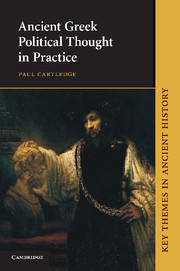Book contents
- Frontmatter
- Contents
- Preface
- Acknowledgements
- Timeline
- CHAPTERS AND NARRATIVES
- 1 Meaning in context: how to write a history of Greek political thought
- 2 The Greek invention of the polis, of politics and of the political
- Narrative I The prehistoric and protohistoric Greek world, c. 1300–750 BCE
- Narrative II The archaic Greek world, c. 750–500 BCE
- Narrative III The classical Greek world I, c. 500–400 BCE
- Narrative IV The classical Greek world II, c. 400–300 BCE
- Narrative V The Hellenistic Greek world, c. 300–30 BCE
- Narrative VI ‘Graecia capta’ (‘Greece conquered’), c. 146 BCE – CE 120
- APPENDIX I Selected texts and documents
- APPENDIX II The ‘Old Oligarch’: a close reading
- Bibliographical essay
- References
- Index
1 - Meaning in context: how to write a history of Greek political thought
Published online by Cambridge University Press: 05 June 2012
- Frontmatter
- Contents
- Preface
- Acknowledgements
- Timeline
- CHAPTERS AND NARRATIVES
- 1 Meaning in context: how to write a history of Greek political thought
- 2 The Greek invention of the polis, of politics and of the political
- Narrative I The prehistoric and protohistoric Greek world, c. 1300–750 BCE
- Narrative II The archaic Greek world, c. 750–500 BCE
- Narrative III The classical Greek world I, c. 500–400 BCE
- Narrative IV The classical Greek world II, c. 400–300 BCE
- Narrative V The Hellenistic Greek world, c. 300–30 BCE
- Narrative VI ‘Graecia capta’ (‘Greece conquered’), c. 146 BCE – CE 120
- APPENDIX I Selected texts and documents
- APPENDIX II The ‘Old Oligarch’: a close reading
- Bibliographical essay
- References
- Index
Summary
What experience and history teach is this – that people and governments never have learned anything from history, or acted on the principles deduced from it.
(Georg Wilhelm Friedrich Hegel, Philosophy of History [Philosophie der Geschichte], 1822–1831)[M]an
Equal, unclassed, tribeless, and nationless,
Exempt from awe, worship, degree, the king
Over himself.
(Percy Bysshe Shelley, Prometheus Unbound, 1820)It is not hard to find quotations from major politicians to justify the importance of any study of the history of political thought. ‘The principles of freedom and the topics of government…will always be interesting to mankind so long as they shall be connected in Civil Society’ was how George Washington put it (ap. Rahe 1992: 581; see Thomas Jefferson ap. Rahe 1992: 709). Modern students are just a little more disenchanted, perhaps, or disabused, yet even the severest critics, whether they realise it or not, are performing an agenda prescribed over 2,400 years ago by Socrates, as reported by his best-known and most brilliant student Plato: ‘The unexamined life is not worth living for a human being’ (Apology 38A).
There is, however, a major difficulty or set of major difficulties in writing a ‘history’ – in any continuous or seamless sense – of political thought. Suppose, for example, that we choose (as recommended by John Pocock in 1962) to try to write a history of political discourse, including or even privileging rhetoric in its particular discursive contexts, as opposed to a history of more abstracted political thinking.
- Type
- Chapter
- Information
- Ancient Greek Political Thought in Practice , pp. 1 - 10Publisher: Cambridge University PressPrint publication year: 2009

